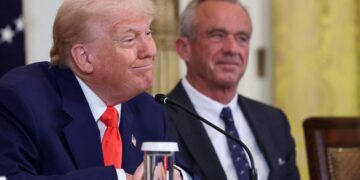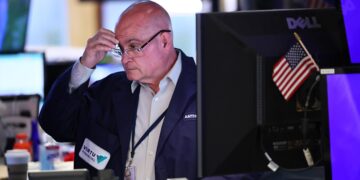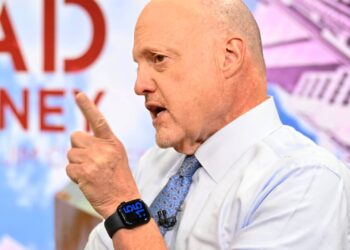Concerns are rising about a “Black Monday” market crash over President Donald Trump’s tariff hikes and the resulting backlash from China.
Major stock indexes plunged in Asia on Monday after Wall Street experienced the worst two days since the pandemic last week, the S&P 500 down 6 percent by market close on Friday while the Dow Jones Industrial Average plunged 5.5 percent. The Nasdaq composite dropped 5.82 percent.
CNBC host and market analyst Jim Cramer on Saturday warned of a repeat of the devastating “Black Monday” collapse of October 19, 1987, when the Dow Jones Industrial Average saw its worse single-day fall and plummeted 22.6 percent.
Tasos Katopodis/Getty Images
The Context
Trump sent the market into a tailspin when he announced far-reaching new tariffs on nearly all U.S. trading partners on April 2. He said the U.S. would impose a 10 percent “baseline” tariff on virtually all imports and higher levies on major trade partners including China, the European Union and Vietnam.
China hit back on Friday, imposing a 34 percent tariff on U.S. imports to match the 34 percent imposed by Trump on Chinese goods. An immediate acceleration of losses in markets worldwide followed China’s response, and economists have warned the trade war could cause a global recession.
What To Know
“If the president doesn’t try to reach out and reward these countries and companies that play by the rules, then the 1987 scenario, the one where we went down three days and then down 22 percent on Monday, has the most cogency,” Cramer said on his show, Mad Money, on Saturday.
“We will not have to wait out too long, will we? We will know by Monday.”
On Monday, Tokyo’s Nikkei 225 index was down 7.2 percent by midday, according to The Associated Press. Hong Kong’s Hang Seng dropped 10.7 percent, while the Shanghai Composite index lost 6.3 percent.
But Trump, who spent the weekend playing golf and attending events at his Florida properties, has shrugged off the fallout, telling reporters on Sunday that “sometimes you have to take medicine to fix something.”
Meanwhile, U.S. futures—a reliable indicator of how stocks will act when the markets open—were also down early Monday.
S&P 500 futures fell around 3.3 percent early Monday, while the Dow Jones Industrial Average futures fell more than 1,000 points or 2.68 percent.
What People Are Saying
Jim Cramer wrote on X on Saturday: “It’s tough to build a new, weaker, world order on the fly. Frantically trying to do it but don’t see anything yet that takes the October 87 scenario off the table yet. Those who bottom-fished are sleeping with the fishes …so far.”
Harvard economist Lawrence Summers, who was treasury secretary under Democratic President Bill Clinton, wrote on X on Sunday: “I think there is a very good chance there’s going to be more turbulence in markets the way we saw on Thursday and Friday. This was the fourth largest two day move since the second World War. The other three were the 1987 crash, the 2008 financial crisis, and the COVID pandemic. A drop of this magnitude signals that there’s likely to be trouble ahead, and people ought to be very cautious.”
Billionaire hedge fund manager Bill Ackman, a staunch Trump supporter, wrote on X: “The President has an opportunity on Monday to call a time out and have the time to execute on fixing an unfair tariff system. Alternatively, we are heading for a self-induced, economic nuclear winter, and we should start hunkering down.”
Entrepreneur and conservative political commentator Patrick Bet-David, a Trump ally, said in a video posted on X on Sunday: “I just want to make sure you don’t get spooked tomorrow if the market is crazy. Just stay in control. Don’t dump everything because it’s probably going to recover quickly. Again I may be wrong, just telling you that’s what I’m doing.”
Asked about the falling markets, President Donald Trump told reporters aboard Air Force One on Sunday: “I don’t want anything to go down, but sometimes you have to take medicine to fix something.”
White House trade adviser Peter Navarro said on Fox News Channel’s Sunday Morning Futures that the administration’s approach to trade would usher in “the biggest boom in the stock market we have ever seen.”
He said: “People should just sit tight, let that market find its bottom, don’t get shook out by the panic in the media.”
What’s Next
Trump has made no indication of repealing or tweaking the tariff hikes in the coming days.
All eyes will be on U.S. markets when they open on Monday morning.


















